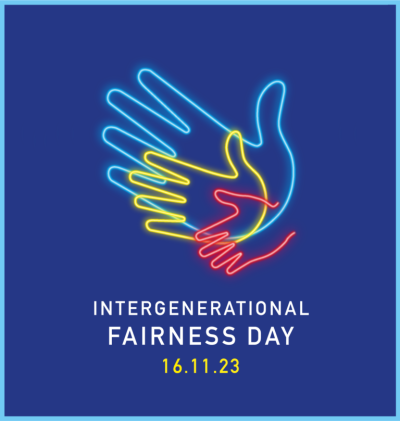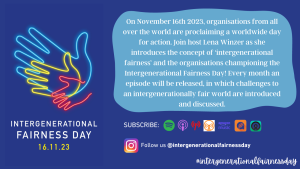Intergenerational Fairness Day
16 November proclaimed Worldwide Intergenerational Fairness Day IFD
In 2023, November 16th was proclaimed as a worldwide day of action by an international network of non-partisan organisations that exist to protect the rights of younger and future generations:
- Foundation for the Future Rights of Generations in Germany
- the Intergenerational Foundation in the United Kingdom
- the Berkeley Institute for Young Americans in the United States
- Generation Squeeze in Canada
- Future Design in Japan
- Partnership for Future Generations in Africa, based in Nigeria
- Think Forward Foundation in Australia
- and UN Next Generation Fellows
- as well as milliongenerations from The Netherlands
Together, they call for greater intergenerational fairness so that the interests of younger and future generations are better protected both nationally and internationally.
Accelerating global warming, escalating (nuclear) arms races, the loss of biodiversity, unaligned artificial intelligence, and human-made pandemics are just some of the new risks experienced by today's youth and future generations that lack adequate government intervention. Within existing public policy, rapidly growing national debts, the cost-of-living crisis, high housing costs, and eroding pensions, are some of the policy areas where young people are losing out.
In too many areas of life society is acting at the expense of young people and future generations. A joint and intensive effort to secure the existence of humanity beyond the next decades is required. The organisers argue that many of these problems are not just national, but global. While the specific context may differ from country to country, the general trend is that governments worldwide focus on solving short-term problems with little regard to long-term sustainability, whether it be natural resources, government spending or investment in the futures of younger and future generations.
Intergenerational Fairness Day wants to encourage people to think about this essential topic and to draw attention to its importance. Government decision-makers must be reminded of their responsibility towards future generations and work together to create a future that is fair and sustainable for all generations.
Intergenerational Fairness Day 2023
In 2023 the day is marked by e.g.,
- a podcast by Lena Winzer of FRFG
- a blogweek on the website of the Intergenerational Foundation with articles from the organisers
- Next Generation Fellow Claudette Salinas Leyva on The Role of the United Nations in Protecting the Interests of Future Generations
- Wales' Future Generations Commissioner Derek Walker on Thinking about future generations in Wales
- Activities of the various national organisations as well as social media outings: e.g. instagram #intergenerationalfairnessday
- an EA forum post by Eli Kaufman
- the first revision of and addition to this website in a long time
Intergenerational Fairness
(adapted from wikipedia entry for IFD)
Intergenerational fairness is a fundamental principle that holds far-reaching implications for societies and the well-being of both current and future generations. This concept underscores the equitable treatment of individuals of all ages, ensuring that the interests and needs of each generation are taken into consideration, addressing a range of significant societal, ethical, and economic concerns. However, it is often noted that democracy tends to be biased towards the present. Scholars, like Dennis F. Thompson, often describe that due to the political system's focus on achieving immediate results within a single term, the long-term consequences of political decisions are often challenging to determine. It is argued that future generations are not well-represented in the political process, while the percentage of elderly voters continues to increase, leading to a potential imbalance in the representation of different age groups. As a result, long-term challenges that will impact future generations may receive limited political or public attention.
Intergenerational Fairness Day emphasizes the importance of policies that take into account society's long-term needs, safeguard the rights of future generations, respect planetary limits, and prevent the deferral of costs without corresponding benefits. This necessitates policies that make long-term investments, address persistent issues effectively, and promote democratic values.Neglecting these issues can lead to economic crises that can affect younger generations disproportionately. Equitable distribution of opportunities and resources across generations is essential to ensure fairness for all members of society. Sustainable economic systems, prudent resource management, and environmental stewardship are vital for leaving behind a healthy ecosystem with adequate resources and a stable climate for future generations. Intergenerational fairness aims to reduce social, political, economic, and environmental inequalities to achieve this.

